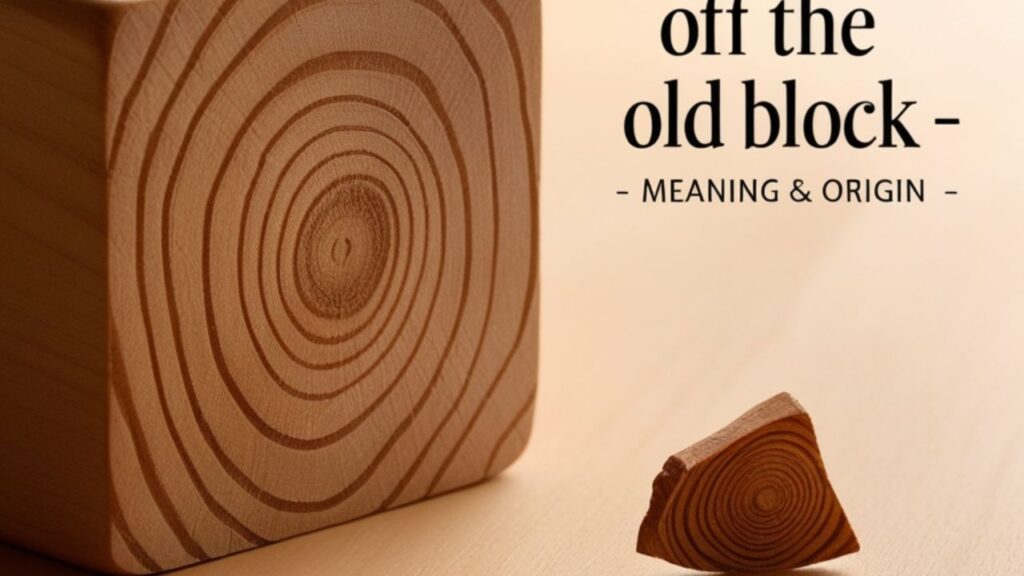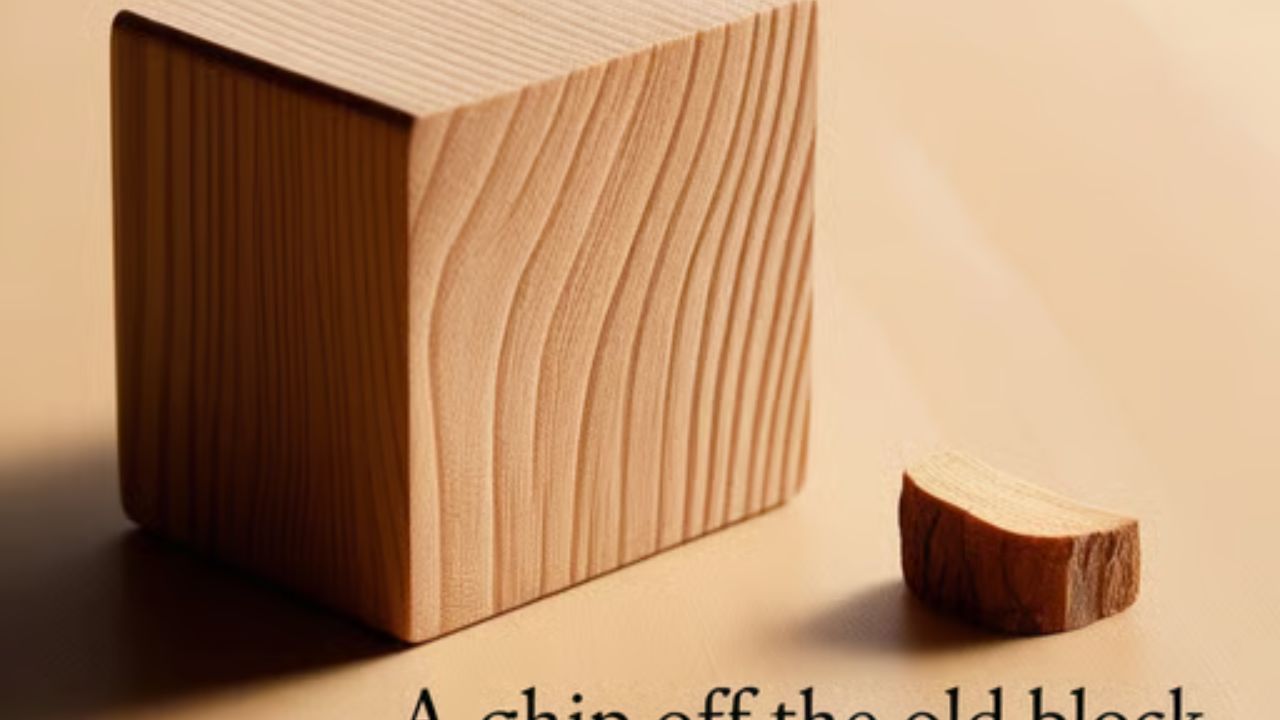This idiom means a child is very much like their parent. It shows how children often act, speak, or think just like their family. The old block is the parent, and the chip is the child, sharing the same nature and spirit.
Long ago, people used this phrase to describe woodwork. A small chip looked like the big block it came from. Over time, the saying became a way to talk about family likeness and inherited behavior. It connects words to the idea of family roots.
Families use it with pride. When a child behaves kindly or bravely, people say the phrase with warmth. It carries love and history together. This expression reminds us that strong values often pass from one generation to the next.
What Does “A Chip off the Old Block” Really Mean?
The phrase A Chip off the Old Block means a child looks or acts like their parent. It shows how traits pass from one generation to another. The saying paints a simple picture of a small piece sharing the same nature as the whole.
People use it to describe family likeness in looks, habits, or character. When someone shares a parent’s kindness, humor, or strength, the phrase fits perfectly. It carries warmth, respect, and pride in the connection between parents and children.
Why Familiar Sayings Like Idioms Matter
- Build Connection: Idioms help people feel closer because they share common meanings and cultural understanding.
- Add Color: They make language lively and interesting, turning simple sentences into expressive ones.
- Save Words: Idioms express deep ideas quickly without long explanations.
- Show Culture: They reflect traditions, values, and ways of thinking from different times and places.
- Teach Lessons: Idioms often carry wisdom or advice that helps people understand life better.
| Idiom | Meaning | Example |
| Like father, like son | Sons tend to be similar to their fathers | “Like father, like son – both love fishing.” |
| The apple doesn’t fall far from the tree | Children resemble their parents closely | “She’s a chip off the old block; the apple doesn’t fall far from the tree.” |
| Cut from the same cloth | Very similar in nature or behavior | “Those two are cut from the same cloth.” |
Tracing the Origin of “A Chip off the Old Block”
The phrase A Chip off the Old Block began many years ago in old English writing. It came from the art of woodcutting, where a small chip looked like the large block it came from. The words show how something small keeps the same form and quality.
Writers started using it to describe family likeness and shared traits. It soon became a symbol of pride and love within families. The saying reminds people that children often reflect their parents’ spirit, linking the past with the present in a warm, lasting way.
See also : All Is Well or All Is Good: What’s Grammatically Right?
Key Historical Notes:
- The saying first appeared in English writings during the 1600s.
- It came from woodcutting, where a chip looked like the block it came from.
- Early writers used it to describe family resemblance and shared traits.
- The phrase later appeared in plays, poems, and books across centuries.
- Similar sayings exist in many languages, showing its shared cultural meaning.
| Language | Equivalent Idiom | Literal Translation |
| German | “Wie der Vater, so der Sohn” | Like father, so son |
| Spanish | “De tal palo, tal astilla” | From such a stick, such a splinter |
| French | “Telle mère, telle fille” | Like mother, like daughter |
The Idiom in Family and Generational Contexts

Family bonds inspire the idiom’s use, especially when discussing children who inherit traits – whether looks, talents, or temperaments.
Nature vs. Nurture: A Chip off the Old Block?
The idea of A Chip off the Old Block fits well with nature and nurture. Nature means the traits we are born with, like talent or looks. Nurture means what we learn from our home, family, and daily life. Both shape who we become.
Children often show a mix of both. They may inherit kindness or courage from parents through nature and learn good manners through nurture. The phrase shows that family influence builds character and connects hearts across generations in gentle, meaningful ways.
- Nature means traits children are born with, like looks or talents.
- Nurture means habits and behavior learned from family and surroundings.
- Both nature and nurture shape a child’s character and values.
- Families pass traits through genes, love, and daily learning.
- The phrase shows how parents influence children in both body and spirit.
When the Apple Doesn’t Fall Far from the Tree
The saying When the Apple Doesn’t Fall Far from the Tree means children often behave or think like their parents. It shows how family habits and values continue through generations. The picture of an apple near its tree makes this idea easy to understand.
People use this phrase with warmth when children share their parents’ nature or skills. It reminds families that love, kindness, and strength can pass on like sunlight through leaves. This expression celebrates the bond that keeps families close in spirit and heart.
When It Doesn’t Fit
Sometimes, the phrase When It Doesn’t Fit describes children who grow differently from their parents. They may have new ideas, interests, or dreams. These differences make families colorful and teach everyone that being unique can be special too.
Parents often feel proud when children follow their own paths. It shows strength, courage, and independence. The saying helps people understand that not every family story is the same. Each person shines in their own way, creating balance and harmony at home.
Literary and Media Portrayals of “A Chip off the Old Block”
Authors and screenwriters love this phrase because family resemblance is fertile ground for drama, humor, and insight.
Literary Examples
- In Shakespeare’s “Hamlet,” the prince shows courage and depth like his father.
- Charles Dickens often wrote about children who shared family traits in spirit and behavior.
- In Jane Austen’s stories, manners and values reflect strong family influence.
- Mark Twain’s characters show how upbringing shapes humor and attitude.
- In Louisa May Alcott’s “Little Women,” the daughters mirror their mother’s kindness and strength.
See also : It Is Must vs It Is a Must: Grammar Rule Explained
Film and TV Examples
- In The Godfather, Michael Corleone shows the same power and calm as his father.
- The Lion King shows Simba following Mufasa’s wisdom and courage.
- In Modern Family, children copy their parents’ funny habits and style.
- Finding Nemo shows Marlin and Nemo sharing bravery and love for family.
- In Back to the Future, Marty and his father share similar dreams and determination.
Practical Uses and Modern Applications
Using “a chip off the old block” in everyday conversation feels natural when you want to highlight similarity within families. Here’s how to do it well:
When to Use
- When a child acts or thinks like a parent.
- When someone shows a family skill or talent.
- When describing kindness, courage, or humor passed through generations.
- When telling stories about family resemblance.
- When praising good qualities seen in both parent and child.
How to Use the Phrase
- Use it in friendly talk when you notice a child acts like a parent.
- Add it to stories or speeches to show family likeness.
- Pair it with other idioms like “the apple doesn’t fall far from the tree.”
- Use it to praise someone’s qualities learned from their family.
- Keep it casual and warm to sound natural in everyday conversation.
Related Phrases to Enrich Expression
- Cut from the same cloth – means two people share similar character or habits.
- Runs in the family – shows that a trait appears in many family members.
- Spitting image – describes someone who looks exactly like another person.
- Like father, like son – expresses how sons often act or think like their fathers.
- The apple doesn’t fall far from the tree – means children resemble their parents closely.
Common Misunderstandings and Misuses
| Misuse | Why It’s Incorrect | Correct Usage Example |
| Using it for non-family similarities | The idiom specifically implies family ties | “She’s a chip off the old block, just like her dad.” |
| Applying it when no resemblance exists | It loses meaning if the resemblance is absent | Avoid using if traits or behaviors differ significantly. |
| Overusing in formal writing | It can sound too colloquial or cliché | Use sparingly or choose a more formal phrase |
Why “A Chip off the Old Block” Still Holds Strong

The saying A Chip off the Old Block stays strong because it speaks about family love and connection. It reminds people how children carry their parents’ qualities with pride. This phrase keeps old traditions alive and gives meaning to shared values and memories.
Families continue to use it because it feels warm and real. It brings comfort when people notice kindness, strength, or talent passed through generations. The words link past and present, showing that family roots remain deep and full of respect.
Summary of What Makes It Work
- The phrase uses a strong image of a chip matching its block.
- It connects family resemblance with love and pride.
- The saying works in both formal and casual language.
- It carries history and culture that people still understand today.
- The words create a warm link between generations and shared values.
Final Thoughts
The phrase A Chip off the Old Block helps people see the beauty of family ties. It shows how love, habits, and dreams pass from parents to children. This gentle saying reminds families that their bond is strong and filled with care.
It carries warmth and respect across time. When families share smiles or stories, these small moments reflect lasting values. The words hold a simple truth about belonging and connection, keeping hearts close and celebrating the strength of shared roots.
Additional Resources and References
- Oxford English Dictionary – gives the full meaning and history of the phrase.
- Merriam-Webster Dictionary – explains how to use the idiom in sentences.
- The Phrase Finder – shares origin stories of many common sayings.
- Cambridge Dictionary – provides simple definitions for learners.
- Grammar Whisper Blog – offers clear examples and modern language tips.
Tables and Visual Aids
- A comparison table showing idioms about family resemblance and their meanings.
- A timeline chart displaying when and where the phrase first appeared.
- A family tree diagram to show how traits pass through generations.
- A word origin map linking similar phrases in other languages.
- A usage example chart with simple sentences for easy learning.
Table: Similar Idioms about Family Resemblance
| Idiom | Meaning | Usage Context |
| A chip off the old block | Child resembles parent | Informal, conversational |
| The apple doesn’t fall far from the tree | The child closely follows the parent | Common, informal |
| Cut from the same cloth | Similar in nature | Formal or informal |
| Runs in the family | Traits common to family members | Informal, descriptive |
| Spitting image | Looks exactly like another person | Informal, visual resemblance |
FAQS:
What does chip off the old block mean?
It means someone closely resembles their parent in behavior, appearance, or character.
Is chip off the old block a compliment?
Yes, it’s usually a compliment showing pride in someone’s similarity to their parent.
Is “chip off the old block” a metaphor?
Yes, it’s a metaphor comparing a person to a small piece from their parent’s “block.”
Why do we say a chip off the old block?
The phrase originates from carving or woodworking, symbolizing similarity between parent and child.

Join Bibcia on a journey to master English grammar. Discover easy lessons, writing tips, and practical examples designed to make learning grammar simple and effective.










